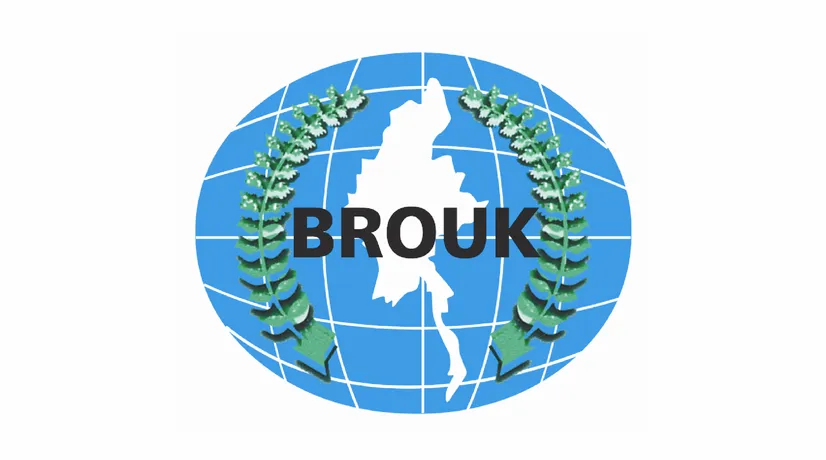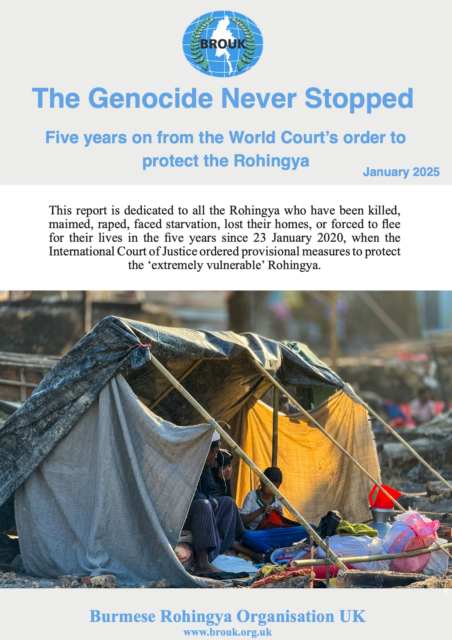The Genocide Never Stopped: Five years on from the World Court’s order to protect the Rohingya
23 January 2025


This report is dedicated to all the Rohingya who have been killed, maimed, raped, faced starvation, lost their homes, or forced to flee for their lives in the five years since 23 January 2020, when the International Court of Justice ordered provisional measures to protect the ‘extremely vulnerable’ Rohingya.
Executive summary
Five years have passed since the International Court of Justice’s (ICJ) issued its legally binding provisional measures order to protect the Rohingya on 23 January 2020. Tragically, ‘never again’ has become ‘yet again’. Many of the human rights violations documented in this report amount to atrocity crimes, including acts of genocide perpetrated by the Myanmar armed forces against the Rohingya and war crimes carried out by the Arakan Army (AA), in breach of the provisional measures ordered by the ICJ to protect the Rohingya. In 2024, several thousand more Rohingya, including forced conscripts, are believed to have been killed in the conflict in Rakhine State and at least 70,000 more have fled to Bangladesh.
The Arakan Army has made swift territorial gains since launching its attacks in November 2023. As of 31 December 2024, the Arakan Army was reported to have seized all but three of Rakhine State’s 17 townships. The Arakan Army is now the de facto authority in most of Rakhine State.
The war in Rakhine State is characterised by both brutality and complexity, with the Myanmar military forcibly recruiting Rohingya men to its ranks and collaborating with Rohingya armed groups. This includes the Arakan Rohingya Salvation Army (ARSA) – the group whose attacks on Myanmar border guard police outposts in 2017 provided the pretext for the Myanmar military to launch its genocidal ‘clearance operations’ against the Rohingya population as a whole. None of these groups – ARSA, the Rohingya Solidarity Organisation (RSO), or Arakan Rohingya Army (ARA) – represent Rohingya communities or fight on their behalf and have been repeatedly denounced by Rohingya civil society.
The regime’s divide-and-rule strategy needs to be analysed within the wider context of the Myanmar military’s long history of inciting hatred towards the Rohingya, dehumanising the group and fomenting violence. Ongoing genocidal intent towards the Rohingya can be inferred from this tactic, particularly when viewed through the lens of the Court’s provisional measures order. Instead of protecting the Rohingya – as it is legally bound to do – the regime has forcibly recruited thousands of Rohingya men and is deliberately putting them in harm’s way on the frontlines of conflict, whilst at the same time inciting hatred and violence towards the Rohingya group as a whole. This strategy is akin to building a tinderbox with the Rohingya at the centre.
Instead of distancing itself from the regime’s underhand tactics to incite hatred towards the Rohingya, the Arakan Army has appeared to lean into it, variously describing the Rohingya as ‘Bengali’, ‘Bengali terrorist’, ‘Extremist Muslim’ and ‘Muslim terrorist’. Since seizing control of most of Rakhine State, the AA has characterised as itself as ‘engaging in an armed struggle for the national equality of all ethnic groups with the Arakan region’, but has yet to embrace the term Rohingya.
The tactics to incite hatred and violence towards the Rohingya employed by the regime have undoubtedly fuelled acts of collective punishment allegedly carried out by the Arakan Army against Rohingya communities, particularly in the Rohingya-majority townships of Buthidaung and Maungdaw, where the Rohingya armed groups have been given free rein to operate by the regime. However, this does not absolve the Arakan Army of responsibility for alleged atrocity crimes.
The Arakan Army has routinely violated international humanitarian law and committed acts which likely amount to war crimes, including forced displacement, arson attacks on Rohingya villages, killings, rape and sexual violence, and torture and cruel treatment. The Arakan Army also continues to forcibly recruit Rohingya men to its ranks, holds several thousand Rohingya men in incommunicado.
detention, and routinely exacts forced labour from Rohingya communities in northern Rakhine State – including for landmine clearance.
At the same time, the regime continues to commission the genocidal act of deliberately inflicting ‘slow death’ conditions of life on the Rohingya group – in essence, the junta continues to deny the basic necessities of life to members of the Rohingya group in Rakhine State. In short, the genocide never stopped.
The regime’s restrictions on freedom of movement for Rohingya in Rakhine State have severely limited access to livelihoods and medical care for decades. Road and waterway blockades, combined with increased restrictions on international humanitarian access imposed by the regime since the resumption of armed conflict in Rakhine State in November 2023, have largely forced humanitarian agencies to abandon provision of the support on which many Rohingya communities were dependent, including medical care.
The ‘acute famine conditions’ forewarned by the UN in November have already taken hold in northern and central Rakhine State. The regime’s actions have not only contributed to the acute famine conditions in Rakhine State, but also to the extreme vulnerabilities of the Rohingya group under these conditions. Acute famine conditions mean that Rohingya IDPs confined to camps – and infants in particular – are extremely vulnerable in the event of an outbreak of diarrhoeal disease. Over the past few months, at least 100 Rohingya IDPs have died from diarrhoeal disease in northern and central Rakhine State, most of them young children.
Moreover, starvation is one of the factors forcing displaced Rohingya from northern Rakhine State to attempt the arduous and dangerous journey to the relative safety of the Bangladesh camps. BROUK warns that significant loss of life may be imminent among Rohingya communities in Rakhine State, due to malnutrition, starvation, and the spread of preventable disease under the conditions of life inflicted on the Rohingya group.
Many of the Arakan Army’s actions are eerily reminiscent of the Myanmar military’s conduct in 2016- 2017, including its use of so-called ‘clearance operations’ to justify attacks on Rohingya villages on the pretext of driving out Rohingya armed groups such as ARSA, RSO and ARA. The AA has also co- opted much of the apartheid apparatus established by the regime – such as restrictions on freedom of movement for the Rohingya – which will likely have devastating consequences for extremely vulnerable Rohingya communities at this time of acute famine. To date, the Arakan Army has abjectly failed to uphold the Court’s order to protect the Rohingya.
Tens of thousands of Rohingya internally displaced in northern and central Rakhine State are in dire need of international humanitarian aid to prevent further loss of life. 112,000 Rohingya – half of them children – are currently trapped in Sittwe township, surrounded by landmines and unable to flee as the conflict edges closer to the city.
After five years, the international community’s repeated failure to uphold international law and protect the Rohingya is a stain on humanity’s conscience. The pain and suffering of Rohingya communities is profound. Rohingya communities can no longer survive through their incredible resilience alone – they urgently need international protection and life-saving humanitarian assistance.
Key recommendations:
- The UK as penholder on Myanmar at the UN Security Council must urgently convene a meeting of the Council, which has the authority under the UN Charter to uphold the Court’s binding orders when there is non-compliance. This should include discussing concrete steps that can be taken against the Myanmar military, Arakan Army, and Rohingya armed groups who are in breach of the provisional measures order to protect the Rohingya, as an urgent matter of regional peace and security.
- The international community must urge Bangladesh to open an emergency humanitarian aid corridor to Rakhine State and allow trade to help end the famine. The international community must also increase their support to the government of Bangladesh to provide protection and humanitarian assistance, including food, medicine and shelter, to ensure the rights and dignity of Rohingya refugees are upheld.
- The ICJ must urgently review Myanmar’s non-compliance with the provisional measures and formally communicate its findings to the UN Security Council. It must instruct Myanmar to make its reporting public at the time of submission to the Court, due to the public interest nature of the case, to ensure transparency and rigorous scrutiny of Myanmar’s compliance with the order.
Announcements
21 May 2025
Open letter: Malaysia must lead ASEAN with principle, not hypocrisy, to address the Myanmar crisis

Progressive Voice is a participatory rights-based policy research and advocacy organization rooted in civil society, that maintains strong networks and relationships with grassroots organizations and community-based organizations throughout Myanmar. It acts as a bridge to the international community and international policymakers by amplifying voices from the ground, and advocating for a rights-based policy narrative.